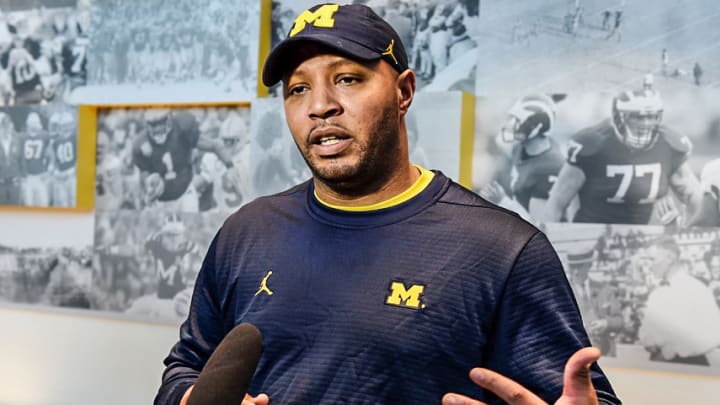How the Uncertainty of the 2020 Schedule Will Affect Coaches’ Preparations and Game Plans

The grind never stops for college football coaches. We know that because we could hear it in offensive coordinator Josh Gattis' voice earlier this year when he spoke about preparing on a short calendar with Jon Jansen on the In The Trenches podcast.
When they’re not coaching, they’re recruiting. When they’re not recruiting, they’re game planning. With that game plan comes thousands of hours of preparation in meetings and studying film. I can assure you that it wasn’t long after Michigan’s Citrus Bowl loss to Alabama on New Year’s Day that Harbaugh and Co. were back in Schembechler Hall beginning to prepare for teams on the 2020 schedule. With the uncertainty of the 2020 schedule, game planning will be one of the key pieces to a team’s success.
Normally, the coaching staff would get together sometime in late January to start discussing the schemes they want to run vs. Washington and others on the front end of their schedule. There is no doubt that the coaches did just that in January and February, but with no spring practice, they weren’t able to share those schemes on the field with players.
Teams will already be behind with installation of their playbooks as many coaches have not seen their players face to face since March. Yes, they had meetings with players virtually, but it is most definitely not the same as being able to run those plays physically. This leads to bigger problems when players start getting together with their coaches over the next few weeks. In what usually would take six to eight months, they will have to learn and install in just over one month.
Teams use spring practice and summer workouts as time to work out the kinks and get thousands of repetitions in so that by the time September rolls around, everything is running smoothly. This leads me to believe that there is a chance many freshmen and sophomores will not be mentally (or physically) ready to play this season. Without getting those true physical repetitions in, it is very difficult for a player to simulate game speed.
With all this being said, I still believe the schedule could be the biggest issue for coaches in 2020. We are near mid-July and have yet to hear any decisions made on what the official 2020 college football season will look like. Will it be a Big Ten Conference-only schedule? Will Michigan add regional MAC and AAC opponents in replacement of their long-distance games? These are just a couple of the many scenarios being discussed by Warde Manuel and other athletic directors across the country. This brings the list of teams Michigan could possibly play this season from twelve to about forty. As I mentioned before, putting together a game plan takes an extensive amount of time and effort for each opponent. Instead of putting together eleven game plans in eight months, coaches are working to put together forty in a quarter of that time.
So, what does this all mean? Coaches and players will be (and have been) scrambling to prepare for the upcoming season. The game plans and playbooks won’t be near as intricate and detailed as they usually are. Coaches will stick to what they know and what their players are comfortable with. I could see many freshmen, and inexperienced players in general, not getting as much playing time as they could or should have, and the inexperienced players who do get in won’t produce as much. Also, plan to see more coverage breakdowns and broken plays this season than in the past. Without repetitions, players will make mistakes both mentally and physically. Hopefully we will have a better idea of the schedule in the coming weeks and coaches will have a chance to put those game plans together.
Justin Roh is a co-host on the Blue By Ninety podcast. You can find their podcast HERE.
